McDonald’s announced a pro-environment initiative, encouraging recycling and eco-friendly alternatives to plastic.
McDonald’s revealed on Tuesday plans to “drastically” reduce plastic use in its Happy Meal toys worldwide by 2025, in a step designed “to build a more resilient planet for the next generation,” the fast food giant said.
“Starting now, and phased in across the globe by the end of 2025, our ambition is that every toy sold in a Happy Meal will be sustainable, made from more renewable, recycled, or certified materials like bio-based and plant-derived materials and certified fibre,” the company said in a statement on its website.
It is now working with partners and experts to come up with new ideas, such as offering kids-favourite movie superheroes in a three-dimensional cardboard that can be built, or board games made of plant-based or recycled game pieces.
McDonald’s is also exploring replacing plastic toy wrappers “with new plant-based and premium certified fibre packaging,” it added.
The company is pushing to get “100% of its guest packaging from renewable, recycled or certified sources, and to recycle guest packaging in 100% of McDonald’s restaurants, by 2025.
“By the end of 2020, we offered guests the opportunity to recycle packaging waste in over 25% of restaurants in our 30 largest markets,” it said.
Read also: Here are the steps Qatar is taking to slip from ‘worst sustainability, air quality’ ranks
“With this transition for our toys, we’re working closely with suppliers, families, and play experts and engineers to introduce more sustainable, innovative designs and help drive demand for recycled materials, to keep McDonald’s communities and beyond smiling for generations to come,” said McDonald’s Chief Sustainability Officer Jenny McColloch.
A source told Doha News that McDonald’s Qatar is studying the implementation of the eco-friendly plan.
The company also announced plans to explore the use of recycled plastic toys to make new serving trays, in a move that will reduce its virgin fossil fuel based plastic use by 90%.
In the UK and Ireland, McDonald’s branches have already started implemented the plan, offering paper-based toys or books, following a national petition urging the chain to stop using plastic toys in its kids’ meals.
Across the English Channel in France, the transition to eco-friendly alternatives has already been completed, where a “One Book or One Toy” programme has been provided as an option to children.
“Sustainable material sourcing is a necessary strategy for mitigating the impact of supply chains on our ecosystems and climate, including the plastic waste crisis,” said Sheila Bonini, a senior vice president at World Wildlife Fund.
“By reducing conventional virgin plastic inputs by a projected 90%, the re-imagined toys will reduce the demand on fossil fuel plastic production to instead create new markets for responsibly sourced renewable and recycled content. And through its immense reach of these toys, McDonald’s can engage its millions of daily customers around the world in the transition to a more sustainable, circular future,” Bonini explained.
Competitor Burger King took on a similar initiative to halt plastic toys from kids’ meals in the UK in 2019.







